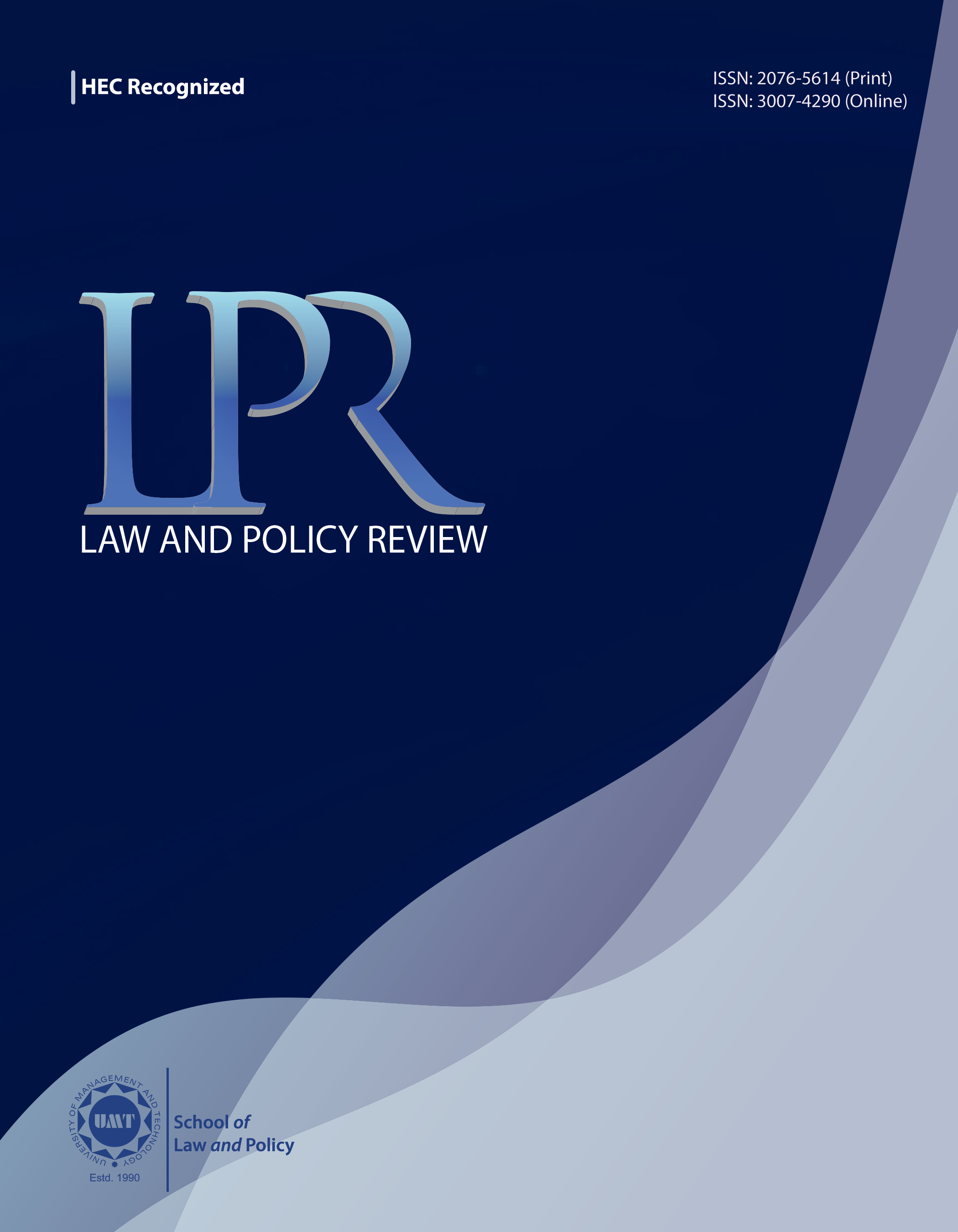Examining the Legality of Surrogacy in Pakistan: An Analytical Perspective of Islam
Abstract
 Abstract Views: 0
Abstract Views: 0
The practice of surrogacy is prevalent worldwide, but it has yet to gain recognition in Pakistan. This study aims to explore the potential for recognizing surrogacy in Pakistan, examining its current status and the reasons it has been largely ignored. As a country founded on Islamic ideology, the practice of surrogacy needs to be justified according to the injunctions of the Holy Quran and Sunnah. This study explores whether the traditions of surrogacy in Abrahamic religions provide any jurisprudential grounds for its implementation in Pakistan. It also discusses the impact of increasing practice of surrogacy in other jurisdictions on Pakistan’s legal system. To understand why there is lack of recognition and legislation regarding surrogacy in Pakistan, this study critically analyzes its societal and cultural acceptance in the context of Islamic society. It examines reasons why surrogacy is treated as a taboo in Pakistan’s parliament and judicial system. In order to thoroughly understand these issues this study examines how the legal system in Pakistan works and how the laws are created. It critically analyses the judicial precedents in Pakistan and briefly explains its legal system to fathom the perimeters how law is created and enforced.
Downloads
References
Abbasi, M. Z. (2017, August 23). Federal shariat court of pakistan on surrogacy: From judicial Islamization of laws to judicial legislation. Courting the Law. https://courtingthelaw.com/2017/08/23/commentary/federal-shariat-court-of-pakistan-on-surrogacy-from-judicial-islamization-of-laws-to-judicial-legislation/
Akhtar, A. (n.d.). Surrogacy in Pakistan: Call for positive legislation. LUMS. Retrieved April 4, 2024, from https://sahsol.lums.edu.pk/node/12889
Asad, M. (2012, November 27). ‘Surrogate’ mother wins long drawn child custody battle. Dawn. Retrieved April 4, 2024, from https://www.dawn.com/news/767195/surrogate-mother-wins-long-drawn-child-custody-battle
Ber, R. (2000). Ethical issues in gestational surrogacy. Theoretical Medicine and Bioethics, 21, 153–169. https://doi.org/10.1023/A:1009956218800
Boulevard, A.-G. (2023, April). A comparative study of surrogacy rights in Iran and European countries, a review. Ethics, Medicine and Public Health, 27, Article e100880. https://doi.org/10.1016/j.jemep.2023.100880
Burki, S. J., & Zring, L. (2024, April 1). Pakistan. Britannica. https://www.britannica.com/place/Pakistan
Farooq Siddiqui v Mst. Farzana Naheed, Sh. Petition No.2/I of 2015, Federal Shariat Court. (2017). https://www.federalshariatcourt.gov.pk/Judgments/Sh.Petition%20No.2-I%20of%202015.pdf
GlobalSecurity.org. (n.d.). Pakistan legal system. Retrieved April 3, 2024, from https://www.globalsecurity.org/military/world/pakistan/legal-system.htm
GOV.UK. (n.d.). Surrogacy: Legal rights of parents and surrogates. Retrieved April 3, 2024, from https://www.gov.uk/legal-rights-when-using-surrogates-and-donors
Hall, A. (2017, June 26). The history of surrogacy, explained. Romper. https://www.romper.com/p/the-history-of-surrogacy-dates-further-back-than-you-might-think-66543
Halvrson, E. (2013, September 11). Religious perspectives. Surrogacy and Ethics. https://surrogacyandethics.weebly.com/religious-perspectives.html
HistoryPak.com. (n.d.). Objective resolution (1949). Retrieved April 4, 2024, from https://historypak.com/objectives-resolution-1949/
Huda. (n.d.). What are the islamic views on breastfeeding? Learn Religions. Retrieved April 4, 2024, from https://www.learnreligions.com/breastfeeding-in-islam-2004497
Immigration and Refugee Board of Canada. (2014a, Feburary 10). Pakistan: Treatment of infertile couples by society; legality of in vitro fertilization (IVF) and the use of sperm donors (2011-January 2014). The UN Refugee Agency. Retrieved from https://www.refworld.org/docid/54ca286d6.html
Islam, S., Nordin, R. B., Nor, H. B. M., & Al-Mahmood, A. K. (2013). Ethics of surrogacy: A comparative study of Western secular and islamic bioethics. The Journal of Islamic Medical Association of North America, 44(1), Article e44-1-5920. https://doi.org/10.5915/44-1-5920
Islamweb.net. (2020, June 1). Use of external loudspeakers during prayer. https://www.islamweb.net/en/fatwa/420610/use-of-external-loudspeakers-during-prayer
Jolly, S. (2017). Cross-border surraogace: Indian state practice. In S. R. Garimella & S. Jolly (Ed.), Private international law: South Asian states practice (pp. 175–197). Springer.
Khan, A. (2017, March 11). Surrogacy in Pakistan. Dawn https://www.dawn.com/news/1319664/surrogacy-in-pakistan
Munir, M. (2008). Precedent in Islamic law with special reference to the federal Shariat court and the legal system in Pakistan. Islamic Studies, 47(4), 445–482.
Panday, A. (2014). Wombs in labor: Transnational commercial surrogacy in India. Columbia University Press.
Pande, A. (2010). Commercial surrogacy in India: Manufacturing a perfect mother‐worker. Signs: Journal of Women in Culture and Society, 35(4), 969–992. https://doi.org/10.1086/651043
Peters, R. (1994). The Islamization of criminal law: A comparative analysis. Die Welt Des Islams, 34(2), 246–274. https://doi.org/10.2307/1570932
Rudrappa, S. (2015). Discounted life: The price of surrogacy in India. Gender, Place & Culture, 23(12), 1813–1814. https://doi.org/10.1080/0966369X.2016.1211585
Saxena, P., Mishra, A., & Malik, S. (2012). Surrogacy: Ethical and legal issues. Indian Journal of Community Medicine, 37(4), 211–213. https://doi.org/10.4103/0970-0218.103466
Smerdon, U. R. (2009). Crossing bodies, crossing borders, international surrogacy between the United Stares and India. Cumberland Law Review, 39, 7–15.
United States Department of State. (2022). Pakistan 2022 international religious freedom report. https://www.state.gov/wp-content/uploads/2023/05/441219-PAKISTAN-2022-INTERNATIONAL-RELIGIOUS-FREEDOM-REPORT.pdf
Usmani, M. H. (n.d.). Sources of Islamic law. Legal Service India. Retrieved April 4, 2024, from https://www.legalserviceindia.com/article/l302-Sources-of-Islamic-Law.html
Copyright (c) 2024 Anwar Rana, Muhammad Waqas Gujjar, Bakhtawar Manzoor, Hassan Akram, Muhammad Ahmad

This work is licensed under a Creative Commons Attribution 4.0 International License.
LPR follow an open-access publishing policy and full text of all published articles is available free, immediately upon publication of an issue. The journal’s contents are published and distributed under the terms of the Creative Commons Attribution 4.0 International (CC-BY 4.0) license. Thus, the work submitted to the journal implies that it is original, unpublished work of the authors (neither published previously nor accepted/under consideration for publication elsewhere). On acceptance of a manuscript for publication, a corresponding author on the behalf of all co-authors of the manuscript will sign and submit a completed the Copyright and Author Consent Form.





